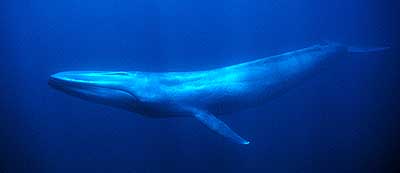|
The Exploitation Of Whales Not Restricted To Hunters Greenpeace condemned the departure of the Japanese whaling fleet, which is heading to the waters of the Southern Ocean whale sanctuary for the 2000-2001 hunting season. By resuming the hunting, Japan is breaking its international commitments (1). Greenpeace has called on the Government of Japan to overrule its national Fisheries Agency, which sponsors the hunt, and recall the ships. "This whaling is carried out by a private institute which was established with a grant from the whaling industry and is subsidised by the Fisheries Agency of Japan", said Sarah Duthie, Greenpeace Oceans Campaigner. "Japan claims that the researchı is conducted for the International Whaling Commission (IWC), however the IWC's scientists have unanimously agreed that they don't need the information produced". Last July, the IWC requested the Government of Japan to refrain from issuing permits to hunt whales in the Southern Ocean whale sanctuary (2). This sanctuary, which surrounds Antarctica, was established by the IWC in 1994 by a vote of 23 1, with only Japan opposed. "The fleet that sailed today returned to Japan only on 20th September from a strongly disputed hunt in the North Pacific," said Duthie. "To turn it around and send it off to the Antarctic is deliberately provocative." The hunt in the North Pacific was also carried out under the guise of 'research', despite the fact that it was not endorsed by the IWC's scientific committee. The IWC also agreed that the main objective of the study did not justify killing whales. On 21st August, fifteen nations (3), led by Ireland, undertook a diplomatic protest in Tokyo expressing deep disappointment that this ³scientific² program was proceeding and calling on the Government of Japan to act in accordance with the decisions of the IWC. ³It is absurd that a private institute and a single government agency should defy an international body and world opinion in this way on behalf of the vested interests of the whaling industry," said Duthie. "Poll results (4) show that only 11% of the Japanese public supports whaling and 14% oppose it. The government of Japan should immediately revoke the permits issued by their fisheries ministry and ensure that no more whales are killed in the Southern Ocean sanctuary in the name of bogus research," concluded Duthie. However, even on this, the most black and white of issues adopted by Greenpeace, the lines between black and white are not as defined as on the back of an Orca. The historical practices of Europe are taken for granted, of which the cruel exploitation of animals for commercial gain is but one such practise. All is well for the middle-classes of the world as long as the animals so exploited are cattle, sheep, hens, pigs and as long as such exploitation is kept out of sight and smell of motorways. Through the eyes of a Maori or an Eskimo or a Laplander, the view is quite different. The sight of a whale in many seafaring indigenous communities raises deeper historical feelings - abundant food and bone and skin for use in ancient cultural and religious practises. Hypocracy may not have been invented by the industrial middle-class, but certainly it was perfected by them, along with the humanitarian point of view as a balancing point. Greenpeace is in real danger of falling into the dangerous habit of promoting that which is of most selfish commercial benefit while clothing such promotion in phrases meant to bear the mantle of universal truth. Whaling, like all matters of conscience can only be dealt with in an enlightened way by enlightened people.. and that takes an openness of mind and detachment from personal gain that as yet eludes the grasp of Greenpeace and of those who hunt whales purely for profit. It might well be that the distance in consciousness between Greenpeace and the Japanese whaling companies is a lot less than that between both of them and the indigenous whalers they variously support or oppose. Notes (1) Japan has ratified the United Nations Convention on Law of the Sea (UNCLOS) and it is in force for Japan. Articles 65 and 120 of UNCLOS require that 'states shall co-operate with a view to the conservation of marine mammals and in the case of cetaceans shall in particular work through the appropriate international organisations for their conservation, management and study'. Japan's failure to heed the resolutions of the IWC places it in breach of this requirement. (2) The IWC's resolution requested that the Government of Japan "refrains from issuing any Special Permits for the 2000/2001 season for the take of minke whales in the Southern Ocean Sanctuary". (3) The 15 countries were: Austria, Brazil, Finland, France, Germany, Ireland, Italy, Mexico, Monaco, The Netherlands, New Zealand, Sweden, Switzerland, United States and United Kingdom. (4) 'Whaling in Japan. Attitudes and Behaviour of the Japanese public. Research study conducted for Greenpeace by MORI social reserch November December 1999. Roughly one in ten (11%) Japanese adults support whaling (2% strongly so) against a similar number (14%) who oppose it (3% strongly so). . .
|

